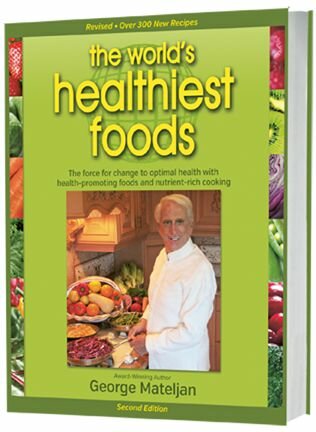 The World's Healthiest Foods are health-promoting foods that can change your life.
The World's Healthiest Foods are health-promoting foods that can change your life.
Try our exciting new WHFoods Meal Plan.
 The World's Healthiest Foods are health-promoting foods that can change your life.
The World's Healthiest Foods are health-promoting foods that can change your life.
Try our exciting new WHFoods Meal Plan.
What are the environmental benefits of organic farming over conventional farming methods?
Organically grown foods are cultivated using farming practices that work to preserve and protect the environment.
Most conventional farming methods used today adhere to a chemical-dependent model of agribusiness. Residues from conventional farming methods use toxic chemicals that remain in the soil, leach into groundwater, and frequently end up either on the skin or become internal constituents of commercially grown foods. The predominant use of this model has resulted in adversely affecting the earth's environment and the health of its inhabitants. These methods have adversely affected:
Organic farming is seen as the alternative to chemical farming. It is often inaccurately and simplistically described as farming without the use of pesticides. More accurately, it is a method of farming which partners with nature rather than altering or controlling natural processes which includes:
Results recently published from a long-term study conducted by researchers at the Rodale Institute in Kutztown, PA, show that organic farming practices help retain significantly more carbon in the soil, making the soil more productive, better able to retain water, and helping to prevent global warming.
Data gathered since 1981 from the Rodale Institute's experimental farms in east-central Pennsylvania on organically grown corn and soybeans shows that the soil retained 15-28% more carbon than conventionally farmed soil, the equivalent of 1,000 pounds of carbon, or 3,500 pounds of carbon dioxide per acre foot of soil. According to Paul Hepperly, research manager for the Rodale Institute, converting the nation's 160 million acres of corn and soybeans would significantly reduce the carbon dioxide produced each year by the United States.
Some conventional growers have responded that the Rodale Institute's numbers are too high to be believable, but Hepperly explains that his excellent carbon sequestration results are due to the fact that organic farming keeps a variety of crops in the field longer than conventional farming. "We grow diversified crops in the organic system, and actually that looks like it's more important than whether it's plowed or not," Hepperly said. "It's the extended cropping season and the crops grown through a longer portion of the season that seem to be very important for the trapping of carbon and nitrogen in the soil. They're retaining the nutrients and building the organic matter through a longer season." State Agriculture Secretary Dennis Wolff and Environmental Protection Secretary Kathleen McGinty said their offices would build on the Rodale Institute research to help develop policies that would allow farmers to benefit from environmentally sound practices.
The Environmental Protection Agency estimates pesticides (some which are known to be cancer causing) contaminate the groundwater in 38 states, polluting the primary source of drinking water for more than half the country's population.
What is sustainable agriculture?
Sustainable agriculture is farming practices that preserve and protect the future productivity and health of the environment. Sustainable agriculture is, however, a wider topic than organic farming. The way food is processed, packaged and transported may pose a threat to the environment, even when the food was cultivated organically. For example, pretzels may be organic—meaning 95% of their ingredients are organically grown—but have been produced from highly refined flour processed using energy-wasting machinery, packaged in non-recyclable plastic, and shipped around the world using large amounts of fossil fuel. Growing foods organically is, therefore, only the first step in achieving sustainable agriculture. Most environmentalists and ecologists and many individuals involved in the production of organic foods believe that sustainable agriculture is necessary if we are to reach the long-term goals of personal health and ecological balance.
In 1988 the United Nation's Food and Agriculture Organization adopted the following official definition of Sustainable Agriculture and Rural Development:
Sustainable development (in the agriculture, forestry and fisheries sectors) should conserve land, water, plant and animal genetic resources, is environmentally non-degrading, technically appropriate, economically viable and socially acceptable.
In the 1990 Farm Bill, the U.S. Congress defined sustainable agriculture as an integrated system of plant and animal production practices that:
In 1992, during the UN Conference on Environment and Development, a number of non-governmental organizations (NGO) drafted their own Sustainable Agriculture Treaty which states:
Sustainable Agriculture is a model of social and economic organization based on equitable and participatory vision of development which recognizes the environment and natural resources as the foundation of economic activity. Agriculture is sustainable when it is ecologically sound, economically viable, socially just, culturally appropriate and based on a holistic scientific approach.Sustainable Agriculture preserves biodiversity, maintains soil, fertility and water purity, conserves and improves the chemical, physical and biological qualities of the soil, recycles natural resources and conserves energy.
Sustainable Agriculture uses locally available renewable resources, appropriate and affordable technologies, and minimizes the use of external and purchased inputs, thereby increasing local independence and self sufficiency and insuring a source of stable income for peasants, family small farmers and rural communities, and integrates humans with their environment. Sustainable Agriculture respects the ecological principles of diversity and interdependence and uses the insights of modern science to improve rather than displace the traditional wisdom accumulated over centuries by innumerable farmers around the world.

Everything you want to know about healthy eating and cooking from our new book.

Order this Incredible 2nd Edition at the same low price of $39.95 and also get 2 FREE gifts valued at $51.95. Read more